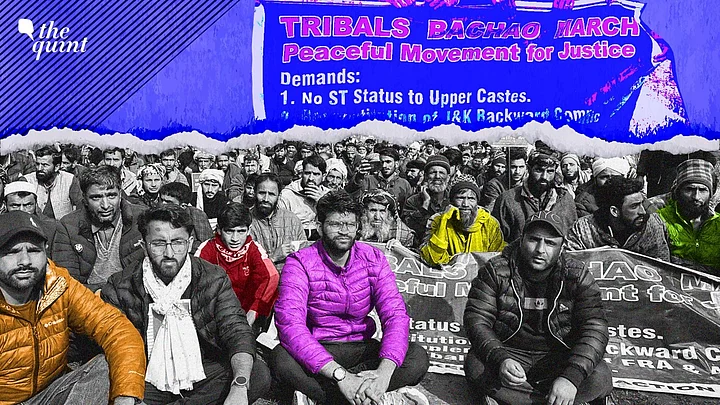Union Home Minister Amit Shah, on his visit to Jammu and Kashmir (J&K) on 3 October, promised reservation to Paharis and assured Gujjar Bakerwals that not even 1% from their quota will be reduced. He also stated that Justice G D Sharma Commission has submitted its report and reservation according to the recommendations of the commission will be given to Gujjars, Bakerwals and Paharis.
While the Gujjar Bakerwals already have Scheduled Tribes reservation, the National Commission for Scheduled Tribes (NCST) endorsed the inclusion of Paharis in the ST list early this month, as reported by The Hindu. The proposal, green-lit by the commission, also called for the inclusion of the ‘Paddari tribe,’ ‘Koli’ and ‘Gadda Brahman’ communities in the ST list of J&K.
In response to the government’s plans to give Paharis ST status, tribal communities in J&K started ‘Tribal Bachao March' from Kupwara to Kathua under the banner of Gujjar Bakerwal Joint Action Committee, headed by activist Haji Mohammad Yousaf Gorsi.
On 9 November, the march reached Srinagar where more than 5,000 people joined it. The protesters have been demanding the rollback of Justice G D Sharma Commission Report and have opposed the ST status for Paharis. They are also against identifying Paharis as an ethnic group as opposed to a linguistic group.
What Scholars Have to Say About Paharis
Noted historian and columnist K D Maini, who identifies himself as a Pahari, writes in a paper,
“Paharis are the inhabitants of the Pir Panchal region and constitute 51 percent of the population of this region. They occupy a large terrain starting from the south of Banihal and going up to Muzaffarabad. Poonch, Rajouri, Uri and Karnah fall in the J&K state while Muzafarabad, Bagh, Sudhnutti, Rawalakote, Kotli, Mirpur and Bhimber are located in the POK. The Paharis are comprised of various castes, creeds, sects and religions. They are Hindus, Muslims and Sikhs and are bounded to each other only through their mother tongue Pahari while canvassing distinct cultural heritage, social, economic and historical backgrounds.”
Sumantra Bose too writes about the heterogeneity of Pir Panjal region in a paper,
“The Muslim majorities in Rajouri and Poonch, unlike those in the Kashmir Valley and Doda, are largely not Kashmiris and mostly belong to other communities such as Gujjars and Bakerwals (traditionally nomadic pastoralists), Rajputs and other smaller ethnic groups.”
Nowhere do K D Maini and Sumantra Bose refer to Paharis as a tribe. If those living in Pir Panjal are Paharis, those living in Chenab valley and in parts of Kashmir equally deserve to be called Paharis and sure enough, similar demands are emerging from those areas.
Gujjar Bakerwals Have a Long History of Marginalisation
Paharis, who are found in the Pir Panjal region and parts of Kashmir valley, belong to various religions and castes, including Brahmins, Rajputs, Sikhs, Muslim Rajputs, Syeds, and Mughals.
How can Brahmins, Rajputs and Muslim upper castes, who held the highest offices and controlled economic activities in Rajouri and Poonch, be at par with Gujjar Bakerwals who reside mostly on mountainous terrains and jungles in far-off rural areas where basic amenities like electricity, public health centre, and schools are still a distant dream?
Even today, Gujjar is used as a slur by the upper castes. People who till yesterday were landlords, tax collectors, and rulers and who proudly identified themselves as Rajputs and used titles like sardar and raja are now claiming to be socially isolated and stigmatised.
Gujjar Bakerwal tribe has been a victim of social stigma because of their lifestyle, culture, and other distinct practices. Historical records, oral and written, describe the injustices meted out to this marginalised community by the upper-class Muslims, mostly during the rule of Jarals, who identified themselves as Muslim Rajputs, from the 12th century to 19th century in Rajouri and adjoining areas.
Gujjar Bakerwal is the third largest ethnic community in J&K after Kashmiris and Dogras. They were notified as a Scheduled Tribe in 1991 after a long struggle of around four decades. Majority of their population is concentrated in Pir Panjal region but they are spread across J&K. More than half a million Gujjar Bakerwals are nomadic and keep moving from one place to another in search of fodder for their cattle, sheep and goats. The 2011 census recorded Gujjar Bakerwals literacy rate at 50%, which is quite worrying.
BJP's Political Machinations
After the abrogation of Article 370 on 5 August 2019, political reservations and Forest Rights Act, 2006 were extended to J&K. Out of nine seats for STs in J&K, five are in Rajouri and Poonch districts, where both Gujjar Bakerwals and Paharis are in good numbers. The delimitation commission report has not gone down well with politicians from upper caste communities and they started politicising the whole issue. The Bharatiya Janata Party (BJP) cashed in on the growing tension between the two communities and started making promises to include Pahari community in the ST list.
Gujjar Bakerwals state that the people who were responsible for historical injustices against them are demanding ST status today. They ask, how can oppressor and oppressed sail in the same boat? Paharis are neither backward nor poor and have no traits that would qualify them to be notified as a tribe. It will be a historic blunder if the Paharis are granted the ST status as it will defeat the purpose of reservation envisaged in the Constitution by the framers of that great document.
(Shahid Ayoub is a PhD scholar in English at the University of Kashmir. He is also the Additional Spokesperson, Gujjar Bakerwal Joint Action Committee.)
